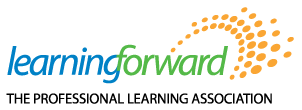Foundations for standards
Several foundations underlie Standards for Professional Learning. Understanding these foundations is critical to understanding the 11 standards themselves and the contexts and support within which they can flourish.
High-quality professional learning improves educator practice and student results.
- The purpose of professional learning is to build educators’ individual and collective capacity to create successful learning experiences for each and every student.
- Educators committed to high-quality professional learning hold high expectations for all learners and assess professional learning’s impact on educators and students.
- Professional learning is a critical improvement lever because when more educators experience high-quality professional learning, more students experience high-quality teaching and learning.
Professional learning systems drive high-quality professional learning.
- Ongoing, job-embedded, sustained professional learning that results in desired outcomes for educators and students is connected and integral to all other school and system improvement efforts. Such professional learning does not happen in a vacuum or separate from other education functions.
- Comprehensive professional learning systems create alignment and coherence for learning. Professional learning systems eliminate silos or gaps between the multiple departments that support educators, including curriculum and instruction; talent development; human resources; school finances; and student support, to name a few.
- Professional learning systems are guided by Standards for Professional Learning and include policies, structures, and resources that support their use.
- Collaboration and collective responsibility are essential to high-quality professional learning. While educators seek improvement at the individual and team level, school- and systemwide improvement are what sustain students’ consistent access to excellent teaching and learning.
- Educators working in aligned and coherent environments share an understanding of the school’s and system’s strategic priorities and goals.
High-quality curriculum and instructional materials are a critical priority for professional learning.
- Research and evidence confirm that the relationship between high-quality instructional materials and student learning yields even greater benefits for educators and students when it is combined with effective professional learning. This priority requires investments in high-quality curriculum and instructional materials paired with aligned professional learning.
- High-quality curriculum and instructional materials are aligned with college- and career-ready standards and are relevant to students, leading to rigorous learning for each student. Educators build capacity to implement, scaffold, and adapt instructional materials for the students they teach.
Educators lead learning for self and others.
Many sentences throughout Standards for Professional Learning begin with the word “educator,” based on the following three embedded concepts related to the word.
Educators hold a variety of roles and titles.
-
- The word educator throughout Standards for Professional Learning represents an educator in any role.
- Regardless of title or role, every educator has responsibilities related to professional learning and thus for each of the Standards for Professional Learning.
- Learning Forward offers additional standards implementation resources for many educator roles to provide greater specificity on particular educators’ professional learning responsibilities.
Educators create and sustain professional learning and professional learning systems.
-
- It is through educator actions and decisions that high-quality professional learning occurs. Taken together, those actions and decisions establish and sustain a professional learning system. Educators are active agents in understanding, designing, implementing, evaluating, advocating for, and experiencing high-quality professional learning and the systems that support and sustain it.
- While their formal and informal roles may mean some educators will spend more of their professional learning attention concerned with specific aspects of applying Standards for Professional Learning, all educators have a role in understanding and implementing all standards.
Educators have a professional ethical responsibility to improve throughout their careers.
-
- Every educator has the responsibility as a professional to continually examine and advance his or her knowledge, skills, practices, and impact on students and colleagues.
- Student and community needs change, technology changes, understanding about all aspects of education changes, and educators have a responsibility to increase their capacity to educate in an ever-evolving world.
Policy guides practice.
- While Standards for Professional Learning describe actions that educators take, policymakers are responsible for establishing policies and providing resources to support the meaningful and sustained implementation of standards.
- Effective policy informs effective practice. As with educator practice, policy that impacts educators is grounded in research, evidence, and the experiences of educators.
- Learning Forward promotes the adoption of Standards for Professional Learning into policy at local, state, regional, provincial, and national levels. To date, 35 U.S. states have adopted or adapted previous versions of Standards for Professional Learning, and numerous other entities have incorporated or used them in guiding practice.
Research informs revised Standards for Professional Learning.
- Insights from research and professional expertise permeate standards. Standards are anchored in evidence about the essential aspects of how professional learning has significant positive effects on educator practice and student learning.
- Research also informs the systemic approach to the conditions, processes, and content that are likely to make professional learning relevant and effective. Educators use all standards in concert and leverage learning systems for sustained transformation.
